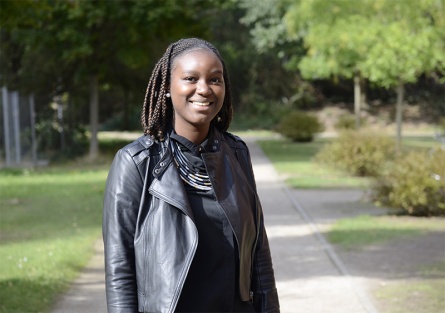
Nadège, you have recently returned from a research trip. Where have you been?
I was at Dakar and I visited Ziguinchor, a city in the south of Senegal, that has seen conflicts for several years but now everything seems to be calm.
What was the purpose of your trip?
During the first week, I took part in a summer school in Dakar that was organised by the Council for the Development of Social Science Research in Africa (CODESRIA) and the Centre for African Studies Basel (CASB). The theme was: "African Studies and Africanists: Whence the Gaze?". As my parents are from Burkina Faso, I've been interested in working with Africans scholars and in Africa. It was interesting to be surrounded by other PhD students from the African continent. I learned a lot about doing a PhD and doing research in Africa. Well, and after that I stayed another week in Dakar collecting information to locate archives and networking. Then I travelled to the South during the third week to explore and learn about the region and came back to Dakar for the final week. These last three weeks of my trip were directly related to my PhD and the research within our B09 project while the first week was more about being a researcher in an African context.
What is you research about?
In our project B09 we are working on social policy in Africa, and in my case it's about social policy related to food security. My recent trip to Senegal helped me a lot to find a more particular and original angle from which to conduct my research.
How did this happen?
I did not make any appointments for any interviews before I started my research trip. I wanted to have first impressions of what's going on at the local level. I did not want to run into the government or NGOs straight away but rather meet and talk with the local population. That is what I did.
Could you already gather information or data that you can use for your research?
Not actually data. But I now know in which direction I want to conduct my research. Speaking with many local people and sitting with them on the market helped me a lot. I also visited some households that I got introduced to. I discussed with these people what they think about social policy and what it means to them. I soon realised that most of them do not even use those terms. It doesn't make sense for them. Most of them use the term public policy. This preliminary research trip helped me to adopt a certain position and a certain vocabulary. I also realised that for the locals food security depends on access to food. Access not so much in financial terms but rather in terms of transportation and local availability. Most people told me that they would like to buy certain kind of food but cannot find it. Or that it is produced for export exclusively. It was interesting to discover that food security is closely related to transport infrastructure and spatial planning.
Which language did you speak with the local people?
I spoke French. But most people in Senegal speak Wolof which I don't speak. That made it a bit harder to make sure people understand me and vice versa. But most of the time I had someone local who helped interpreting when people did not speak much French. But I will do my best to learn basics of Wolof soon.
What are your next steps?
Now I have to write my thesis proposal. Thanks to this preliminary field trip and the readings, I had done before I should be fine. Now I have ideas of how I want to conduct my research and it's more grounded because I've been in the country.
Have you planned next trips already?
If my thesis proposal is approved, I hope I will be able to go back to Senegal for a longer period of time. Time is really a constraint. I cannot leave all my activities here in Bremen but it's really important for my ethnographic research approach to be in the country and to stay as long as possible.
Contact:
Alex Nadège Ouedraogo













